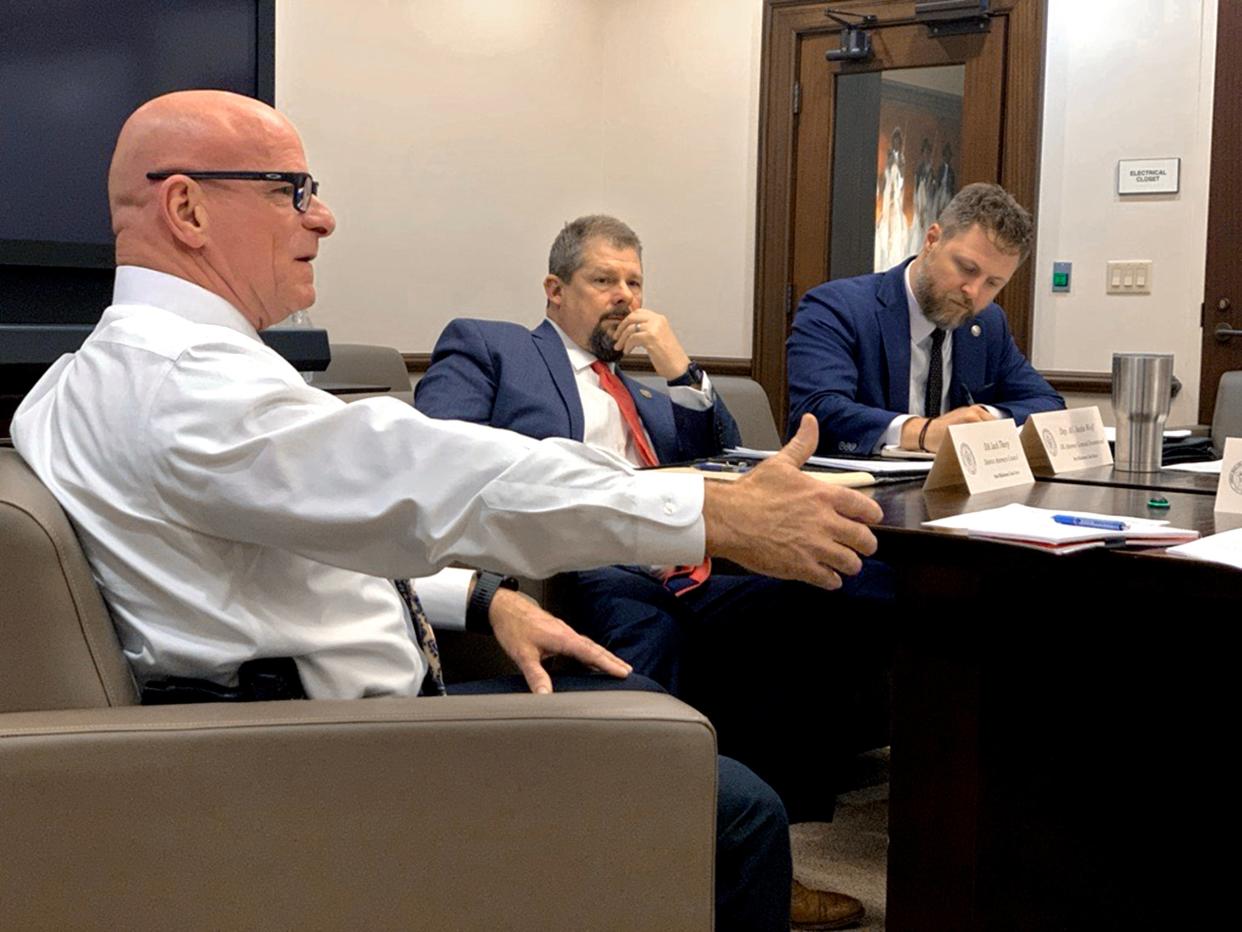Oklahoma task force looks to resolve tribal reservation safety issues without tribal nations

A task force launched by Gov. Kevin Stitt will attempt to create a standard working agreement for state and tribal public safety agencies, but without any say from tribal leaders, at least for now.
Tricia Everest, Oklahoma’s public safety secretary, said at a task force meeting Monday that she doesn’t believe Congress will resolve any questions about policing powers that stem from McGirt v. Oklahoma, a landmark 2020 Supreme Court decision. The ruling has led to the recognition of nine tribal reservations in the eastern half of the state — and drawn constant ire from Stitt because states have limited power over tribal citizens on tribal lands.
He created the One Oklahoma Task Force in December to address the “havoc” caused by the ruling and appointed Everest as the group’s chair. He asked the group to come up with a range of potential fixes, including possible changes to federal law. Everest said legislation appears unlikely, however.
“I was told that Congress in no way, shape or form is going to touch any of this,” she said.
She proposed updating an existing federal law enforcement agreement to match the day-to-day realities of policing tribal areas. The new document would spell out how cities, counties and state agencies work with tribal nations to keep all people safe.
The task force talked about Everest’s proposal for the first time Monday. But at one point, Sen. Jessica Garvin, R-Duncan, paused the discussion to ask about the most notable absences from the meeting.
“There may be some tribal leadership in here that I’m not — ”
“There’s not,” Everest interjected.
“OK, so do we even know that they’re going to be amenable to signing something new?” Garvin said. “I mean if they’re not in the room — ”
Everest, sitting in front of a portrait of the Cherokee linguist Sequoyah, said whether or not tribal leaders are present, they would always have a seat at the table.
Why leaders of the Five Tribes opted out of Gov. Kevin Stitt's task force
Criticism over the lack of tribal representation has permeated the task force for months, ever since the governor created the group and assigned two spots to be shared among the 39 tribal nations based in Oklahoma. Many tribal officials decided to boycott the task force in response.
Leaders of the Five Tribes officially opted out, raising concerns about the group’s makeup and intent.
“What we cannot do is participate in an effort that spreads falsehoods about the law, attempts to minimize tribal voices and engages in political attacks instead of constructive government-to-government dialogue,” the Cherokee, Chickasaw, Choctaw, Muscogee and Seminole nations said in a January letter to Stitt.
More: Oklahoma courts drop some tribal tag tickets, but bigger questions remain
Jack Thorp, a district attorney in northeast Oklahoma who sits on the task force, said he believes tribal leaders would be open to talking through problems and finding solutions. He pointed to a conversation he had earlier this month with Cherokee Nation attorney general Chad Harsha about common concerns in their region.
Thorp also pointed to the fact that tribal nations worked out dozens of agreements with law enforcement agencies soon after the McGirt decision. He said those agreements have worked for all agencies.
“From their standpoint, they need city, county, state law enforcement to police their reservations, and so it works back and forth for that,” Thorp said. “So they’re generally pretty agreeable. I think absent, maybe just, if we get up to Oklahoma City-type fights.”
Everest said she did not want to try to update every agreement that already exists, but instead create a new umbrella agreement that agencies could use. She suggested several changes to a 2005 model agreement created by the Bureau of Indian Affairs and created a pair of working groups to come up with detailed suggestions on how to update the wording.
As one idea, she proposed adding a section to reimburse agencies that provide extra officers at the request of tribal nations.
Jason Chennault, the Cherokee County sheriff, pushed back against the suggestion, saying he didn’t like it a bit.
“As long as our Native Americans are still paying taxes, they’re paying us,” Chennault said.
More: Oklahoma Gov. Kevin Stitt signs compact with Cherokee Nation, state's largest tribe
One of the biggest discussion points was making sure officers do not face the potential of being sued for responding to calls involving Native Americans.
Department of Public Safety Commissioner Tim Tipton said the possibility weighs on troopers’ minds in heated situations.
“I don't know how to clear that all up,” Tipton said. “I don't even know if, from a state standpoint, if we can bring more clarity.”
The task force will next meet April 1 and has until June 1 to deliver its recommendations to the governor.
Tipton and others said education and training will be the key to whatever the group ultimately decides, so officers writing tickets and responding to calls know how the McGirt decision affects them. There’s a lot of uncertainty now, said John Weber, a Sallisaw police officer who is representing the Oklahoma State Fraternal Order of Police on the task force.
“If you go to talk to 13 different counties and 13 different cities, they’re doing 13 different things,” he said.
Molly Young covers Indigenous affairs. Reach her at [email protected] or 405-347-3534.
This article originally appeared on Oklahoman: Oklahoma launches reservation policing task force without tribes
